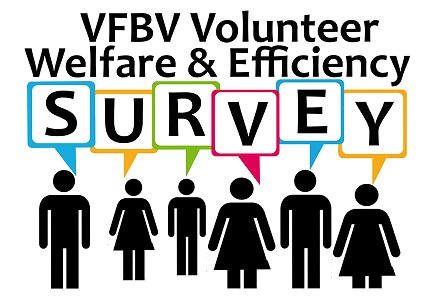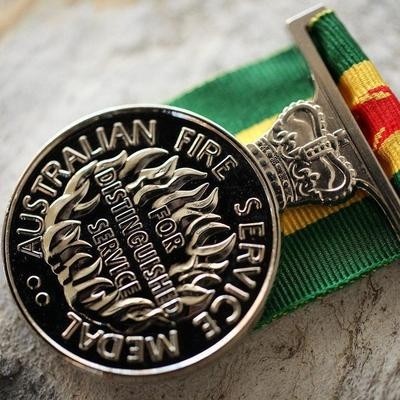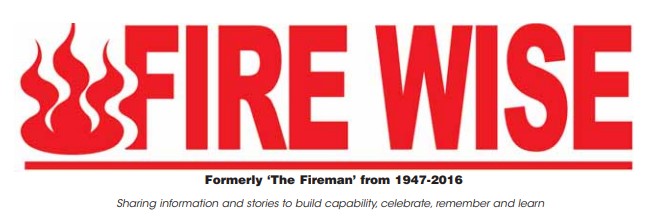From the Ashes
By Adam Barnett, VFBV Chief Executive Officer
There is a quote attributed to ‘The Second Ash Wednesday’ by Bardsley, Fraser and Heathcote that says ‘the lesson of experience is that we do not learn from experience’. There is a more poetic version used by University of Wollongong academics Eriksen and Head that describe the ‘repetitive rhythm in its findings’ to describe Australian bushfire research, reviews and the topics that arise following major bushfires in Australia.
I don’t use these quotes to suggest that we have learned nothing from previous fires, in fact the contrary would be true. And fire services in particular have often led the charge. But how about the wider emergency management sector and instrumentalities including local government?
I pose the question of whether we have maximised the learnings of these disasters using the benefit of time and hindsight long after the public focus fades from memory? Have we really done enough to embed these learnings into today’s context, especially given the very high price we have paid in terms of the loss of precious life from many of these disasters.
In the forward of ‘Ash Wednesday in Upper Beaconsfield’ published nine years after Ash Wednesday in 1992, Ian Symons AFSM, who was at that time a CFA Chief Superintendent and OIC of the then Region 8 writes; “This book provides a picture of what did happen almost ten years ago and how today’s community grew out of the ashes. It also provides a stark warning of what could happen again if we forget the lessons of the past.” Ian, who continues to be a committed CFA volunteer today, rounds out his foreword with the following sage advice: “I hope that those who read it will be motivated to take whatever preventative measures and actions they can to help avoid such devastation and community disruption from occurring again.”
This month will mark 40 years since the Ash Wednesday fires of the 16th February 1983.
For a quarter of a decade, these fires were the deadliest bushfires in Australian history until the Black Saturday fires of 2009. Across Victoria and South Australia, a total of 75 people died, including 14 CFA volunteers and 3 CFS volunteers.
The lead up to Ash Wednesday depicts the perilous state of affairs that preceded that fateful day. Victoria was in drought. Rainfall was low, and summer rainfall in particular was down 75% from previous years.
The Victorian bushfire season commenced in November 1982, and the earliest total fire ban day ever declared at the time, was made on the 24 November 1982. There were to be 22 total fire bans declared during the 1982/83 fire season.
Large fires burned from 3 December to 1 February 1983 affecting Ballan, Cann River, Mount Donna Buang, and Mount Macedon.
On the 9th February 1983 strong wind gusts lifted over 200,000 tonnes of soil and dirt into the air and mixed it with the smoke from the fires to create a vast dust storm that blanketed southern Australia.
By early morning on Ash Wednesday, 104 fires were already burning across Victoria with many of those controlled by 2pm. A hot dry northerly pushed temperatures into the 40s and humidity levels dropped below 15% creating a tinderbox of fine fuels across the State.
By 3pm a cold front hit South Australia with a change of wind direction and winds of up to 100km per hour that then travelled towards Victoria reaching the Victorian fire fronts in the late afternoon and early evening. The wind change caused fires to merge and caused the long flank sides of many of the running fires to become the front, with the wind fanning extreme conditions. Most of the losses of life occurred in the hour following the wind change.
CFA attended 180 different fires throughout the State on that day, eight of which were considered of major proportions affecting Cudgee/Ballangeich; East Trentham/ Mount Macedon; Otway ranges; Belgrave Heights/ Beaconsfield Upper; Cockatoo; Monivae; Branxholme; and Warburton.
In addition to the fatalities, the statistics of that fire season are confronting. On Ash Wednesday alone, 2,080 homes were destroyed or damaged; 32,750 head of stock were lost; 8,000 kilometres of fencing were burnt, and 200,000 hectares were burnt. When accounting for all fires over the 1982/83 fire season, the Forestry Commission recorded that more than 606,000 hectares (including 486,000ha of parks and forests) were burnt. For comparison the 2009 Victorian Bushfires Royal Commission recorded 173 fatalities and 430,000 hectares burnt.
From Ash Wednesday came many improvements to the fire services. Refined ‘Red flag’ warnings and the intricate processes to ensure all crew members are advised of changing conditions is one example. Another example arose from CFA highlighting the problems arising when police refused access to CFA volunteers and CFA tankers into the fire areas on the grounds that the conditions were too dangerous. This highlighted that police had taken on a controlling role under DISPLAN rather than a coordinating one, and had unilaterally overridden the statutory powers of the CFA Chief Officer and impacted fire suppression. This was rectified with haste ensuring all agencies understood that CFA has by law unfettered access to all fire areas under direction of the Chief Officer.
The lack of a dedicated fire prevention department within CFA was also highlighted, which resulted in the commissioning of community safety and fire prevention officers within CFA and what we know today as the community preparedness directorate to lead public education and safety messages.
As too were improvements in heat shielding and ensuring all tankers were fitted with heat shields to protect crews. The vaporisation of fuels that inflicted CFA tankers highlighted the need to transition to diesel fuels which had much higher flashpoints.
One only needs to look at the pictures of Ash Wednesday to observe the standard of personal protective clothing in use at the time. To quote the bushfire review committee “Adequate protective clothing is needed for all firefighters and should include helmet, overalls, gloves, boots and suitable eye protection.”
And training was identified as a major issue, with the committee recommending the need for wider use of survival training for individual firefighters. One only needs to review CFA’s current recruit training and annual burn over drill requirements to see the genesis of these modern-days safety improvements.
So, what are some of the things that might be worth revisiting?
The Ash Wednesday fires bought to light the perilous state of municipal disaster plans. The report into the bushfires found that only 41 out of the 211 municipalities were reported as having disaster plans.
Given that the requirement to have regional and municipal fire prevention committees was excised from the CFA Act in 2018 and replaced with broader ‘emergency management plans’ under EMV - how confident are we these plans are actually an improvement and are adequately setting in motion the required annual works to mitigate and treat bushfire risks on public and private property?
The actual recommendation from the bushfires review was “Local authorities must heed the advice of Regional and Local Advisory Committees concerning fire hazard control and take action accordingly; if necessary, local authorities should be placed under stronger mandatory requirements.” And “Some municipal fire prevention plans are below the required standard because of inappropriate proper officers, or no proper officers at all. Proper officers should be replaced by fulltime Fire Prevention Officers with independent powers. “
And then there are these two recommendations: “Responsibility for roadside fire prevention measures must be clearly defined, and implemented accordingly.” Followed by “Local government legislation should be amended so that conservation interests cannot overbear sensible fire prevention and protection measures.”
Forty years on – how do we think progress on those last two recommendations would be judged? The same difficulties of planned and fuel reduction burning that we are reporting today echoes throughout the bushfire review committees final report.
The report also articulates the value of the CFA model and is worth quoting in full.
“The intricacy and breadth of activity involved in preparedness and response at local community level underlines the value and indispensable nature of the voluntary effort which is forthcoming from within the community itself. This is particularly so in the case of CFA but the contribution made by other community- related organisations (such as local SES units, Red Cross, Country Women’s Association, Church bodies, WICEN, hospital auxiliaries) must not be overlooked. In a very real sense, therefore, the local community participation constitutes a resource without which successful counter bushfire and other-disaster action cannot be achieved.”
“A viable alternative to the current CFA system would, in the view of the Committee, be difficult, if not impossible, to find and would be prohibitively expensive. This local resource and contribution must be preserved. Moreover, it must be given all possible support and assistance to function effectively. Thus policy and organisational measures which are applied from regional and State Government level, must be designed to give proper weight to the CFA system.”
How would current policy be judged against this wisdom paid for by the blood and sweat of the thousands of Victorian’s involved in the 1983 bushfires?
To all those members who were involved in the Ash Wednesday Fires, and those of the 1982/83 bushfire season, we pause this month to remember and pay tribute to your sacrifice and tremendous efforts. On behalf of all volunteers I say thank-you.
To policy makers and those in positions of authority, please honour our fallen and the sacrifices of the living by heeding the wisdom and foresight of these past disasters and reviews so we are not doomed to repeat them.
I close this month’s column with the words from the Spirit of CFA to honour all members who stand in defence of their communities.
Hailing from all walks of life, you are our fathers and mothers, our brothers and sisters, aunts and uncles, our grandparents, neighbours and our friends. You help and protect us, without wanting or recognition of reward. In our time of need you are there. Your courage and compassion are inspiring, your loyalty unquestionable. You comfort us with a tender hand; you stand at the face of nature’s beast and fight for our lives and our land. You are the essence of the true meaning of community. You epitomise the Australian spirit, the spirit of CFA.
Final Days

The Vol Survey will be closing on Wednesday 15 February. Scan the QR code below, or visit the VFBV website to complete it today.

2023 State Championships: Entries Closing Soon

Entries for the 2023 State Championships as well as judge and officials registration are closing soon.
Brigade and team entries will again be collected online for the 2023 championships. Please visit tinyurl.com/2023-champ-entry-open for links to enter your team or register as a judge or official for any of the championships by Sunday 19 February 2023.
The State Championships will again be held in Mooroopna in 2023 with the Urban Junior competition taking place on the weekend of 18 and 19 March. The following weekend, 25 and 26 March, the Urban Senior and Rural State Championships will take place.
The 2023 will also mark 150 years since the recorded official demonstration which involved brigades from across Victoria to demonstrate their skills to people of Melbourne. This first demonstration commenced with a Torchlight Procession through the streets of Melbourne. While many of the competition events have changed since 1873 the Torchlight Procession has remained largely unchanged and will be conducted again at the 2023 State Championships following a successful return in 2022.
Participation in the torchlight procession is open to all brigades competing at the Urban Senior and Rural Championships as well as any interested non-competing brigades. If your brigade is interested in participating in the Torchlight Procession, please contact This email address is being protected from spambots. You need JavaScript enabled to view it. to register your brigade’s participation.
Visit the VFBV website to register for any of the 2023 State Championships. The website also has information for competing brigades, updated rule books for both the urban and rural competitions as well as lists of local competitions being conducted in the lead up to the State Championships.
If you require an assistance during the registration process or for more information on the Championships, please contact the VFBV office on This email address is being protected from spambots. You need JavaScript enabled to view it. or 9886 1141.

Ash Wednesday

A reminder that the 40-year commemoration of the Ash Wednesday fires of 1983 service will be held on Sunday 12th February 2023 at the Ash Wednesday Bushfire Education Centre in Cockatoo.
In person bookings are now closed. The service will be live streamed for those unable to attend on the day and will be available from the CFA website.
CFA Donations Trust: Call for Trustees
The VFBV Board is calling for nominations from interested volunteers interested in being a VFBV appointed trustee to the CFA and Brigades Donations Fund.
The purpose of the Fund is to raise and receive money and donations of goods and services from the public for distribution to Brigades to assist with costs of purchasing and maintaining firefighting equipment, facilities, training and resources and administrative expenses of Brigades which are associated with their firefighting functions.
Over recent years this Trust has been very busy managing the donations received following the 2019/20 bushfire season, with initiatives such as the District pick list program where brigades could select from.
Following nominations, five new or reappointed members will be appointed by the VFBV Board to serve as VFBV Trustees on the Fund for a term of two years.
All current Trustees are eligible for re-appointment.
The Trust Fund committee meets quarterly, either via teleconference or at CFA HQ.
Nominations close Friday 16th June 2023 and can be mailed to VFBV office, 9/24 Lakeside Drive, Burwood East 3151 or emailed to This email address is being protected from spambots. You need JavaScript enabled to view it.
AFSM honours

The 2023 Australia Day Honours list recognised five CFA members for their contribution to the Victorian community among more than 1,000 recipients of honours announced on Australia Day.
Recipients of the AFSM were Mark Cartledge, Neil Marshall, Michael Rowe, Robert ‘Toddy’ Small and Ken Stuart.
VFBV congratulates these five CFA members for their outstanding contribution to the broader community along with the other Australian’s recognised in the Australia Day honours list this year.
Two Fire Rescue Victoria members also received the Australian Fire Service Medal in the honours, Assistant Chief Fire Officer Tony O’Day and Acting Assistant Chief Fire Officer Guy McCrorie. VFBV extend our congratulations to both Tony and Guy also.
You can read more about each of the CFA recipients on the VFBV website.
Fire Wise – February 2023 online only edition

The February 2023 edition of Fire Wise has been published online only, this edition and past editions are available from the Fire Wise website.
You can support Fire Wise and the role it plays as an independent voice in keeping volunteers informed by becoming a subscriber. To become a Fire Wise subscriber visit the Fire Wise website or contact the Managing Editor of Fire Wise, Gordon Rippon-King either by phone 0402 051 412 or email This email address is being protected from spambots. You need JavaScript enabled to view it.
Recent articles on the VFBV website
Now Open – 2022 VFBV Volunteer Welfare & Efficiency Survey
2023 State Championships Entries Now Open
Enjoy the VFBV monthly newsletter?
If you enjoy reading the VFBV newsletter each month, why not share it with your fellow volunteers?
Either share this page with others who may enjoy the articles or encourage other volunteers to sign up to receive their own copy via email each month here.

